2022届高三英语二轮复习英语语法定语从句课件(157张ppt)
文档属性
| 名称 | 2022届高三英语二轮复习英语语法定语从句课件(157张ppt) | 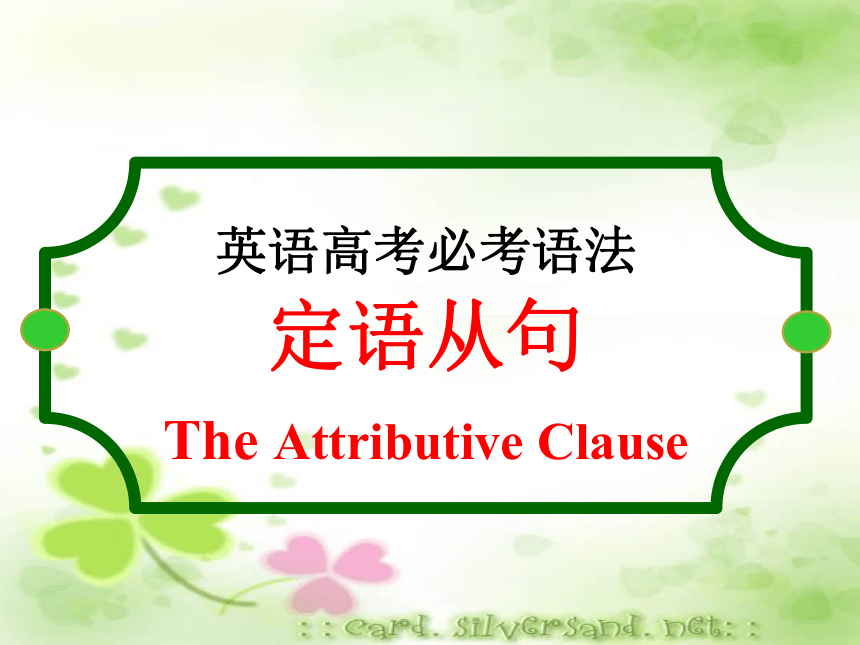 | |
| 格式 | zip | ||
| 文件大小 | 1.5MB | ||
| 资源类型 | 教案 | ||
| 版本资源 | 通用版 | ||
| 科目 | 英语 | ||
| 更新时间 | 2022-03-15 11:21:51 | ||
图片预览

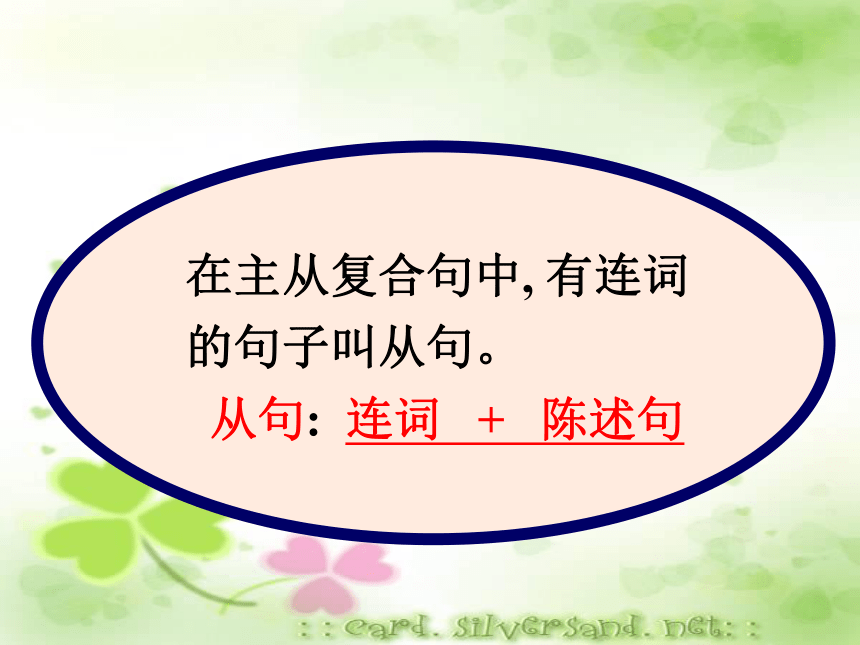
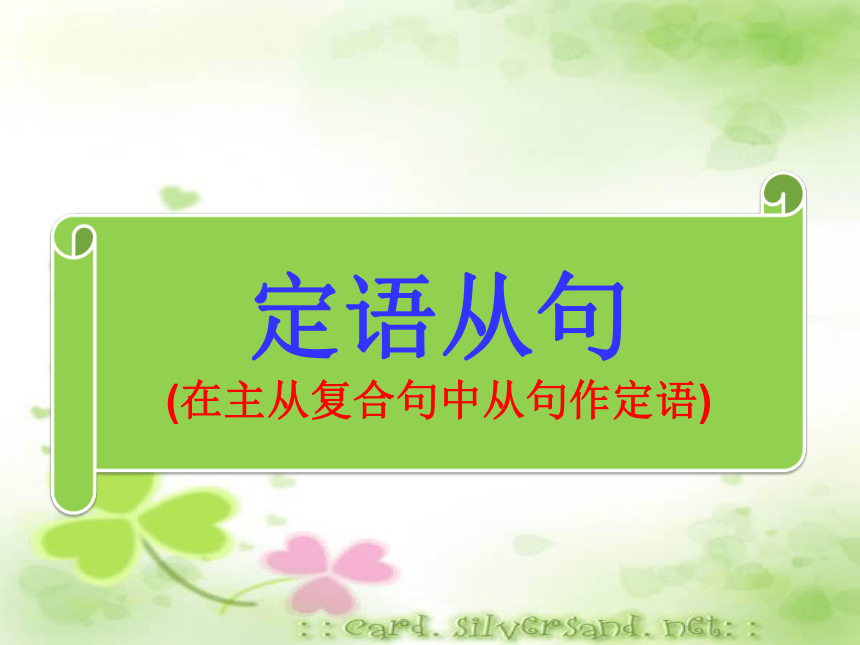
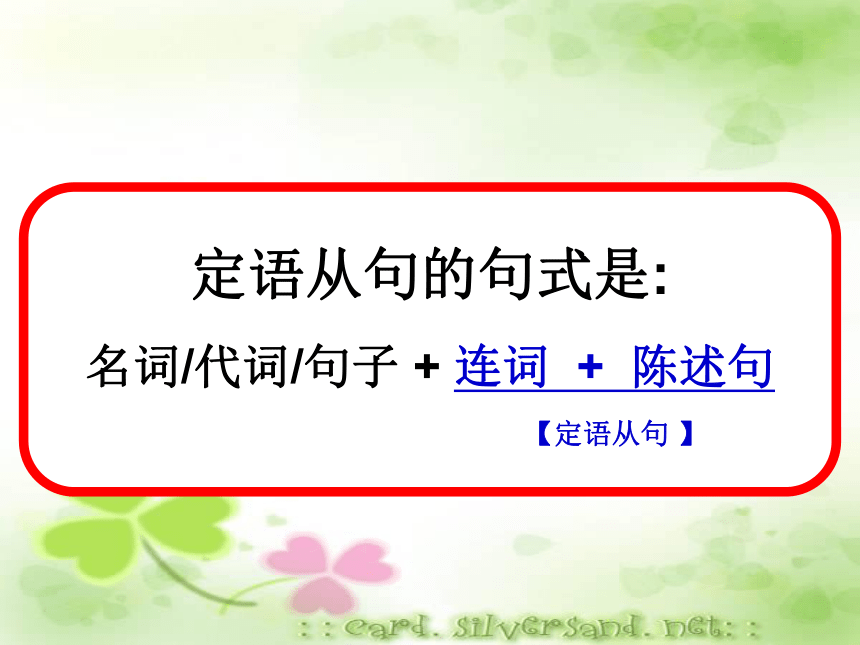
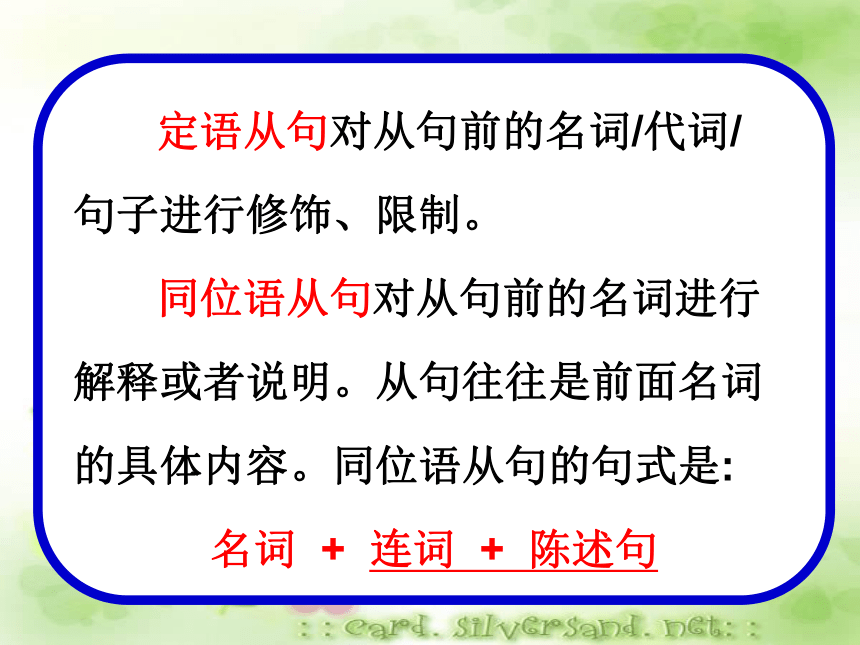
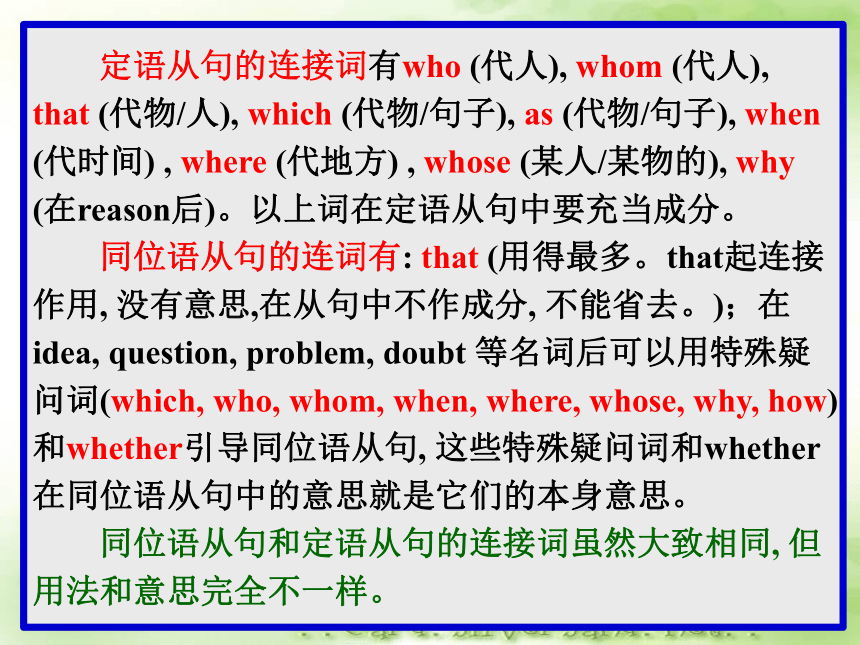
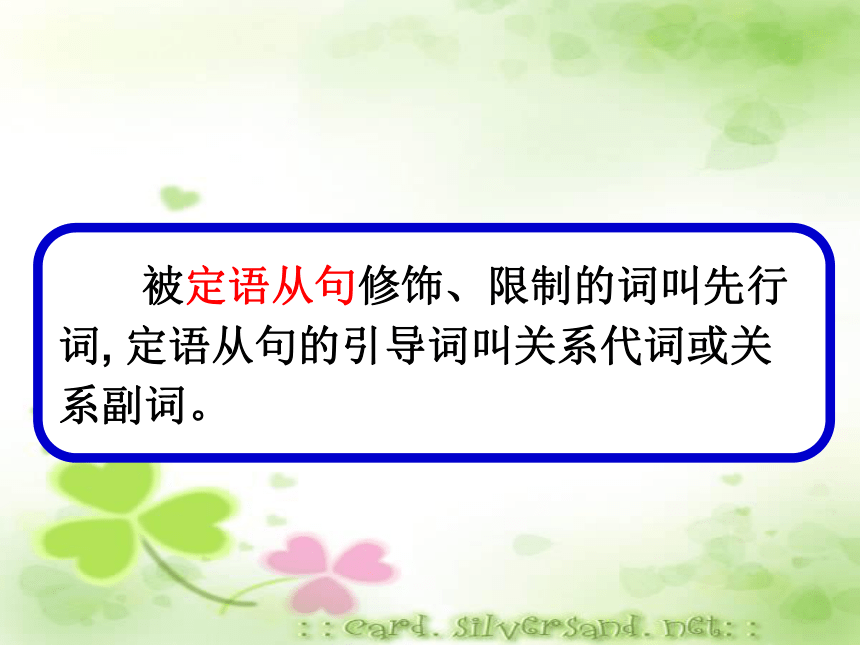
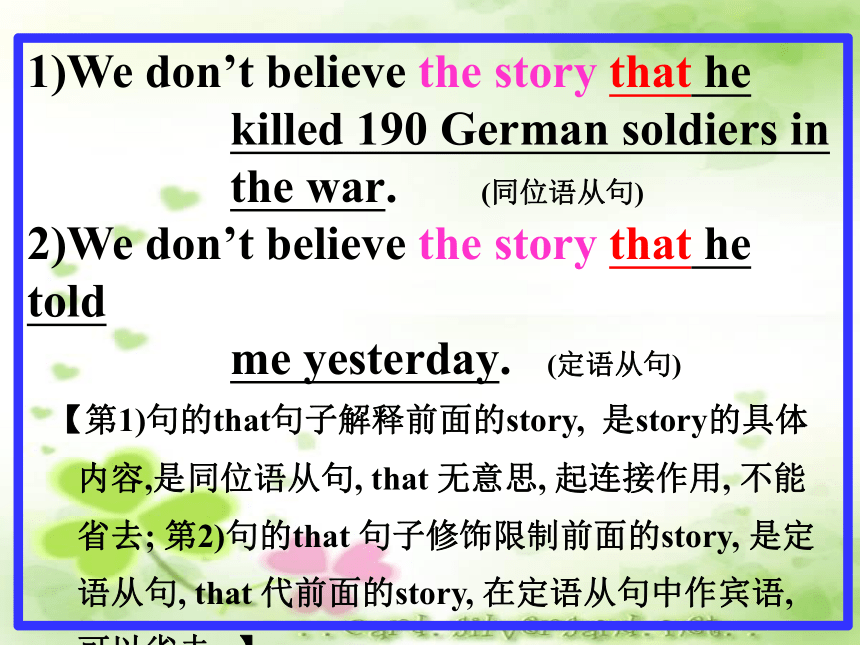
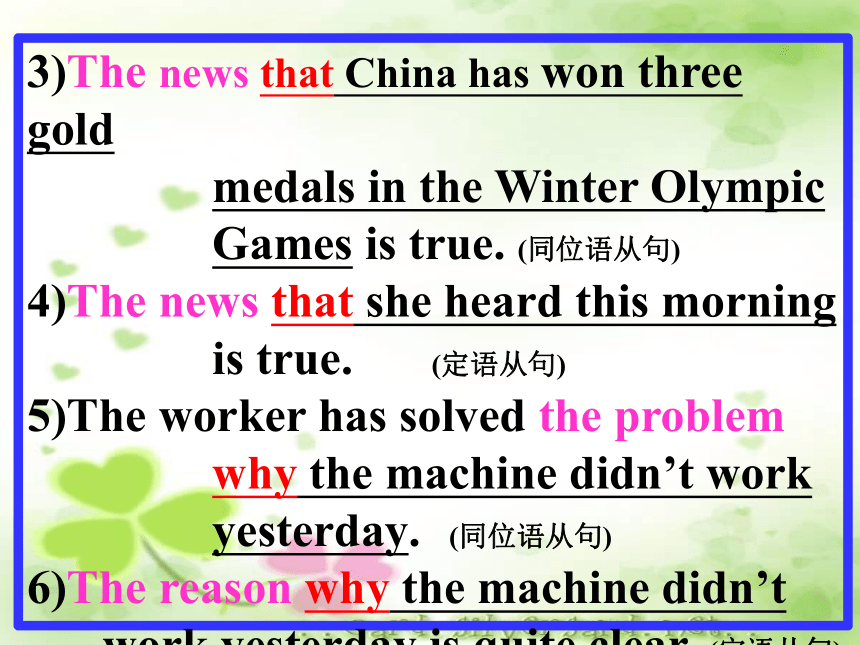
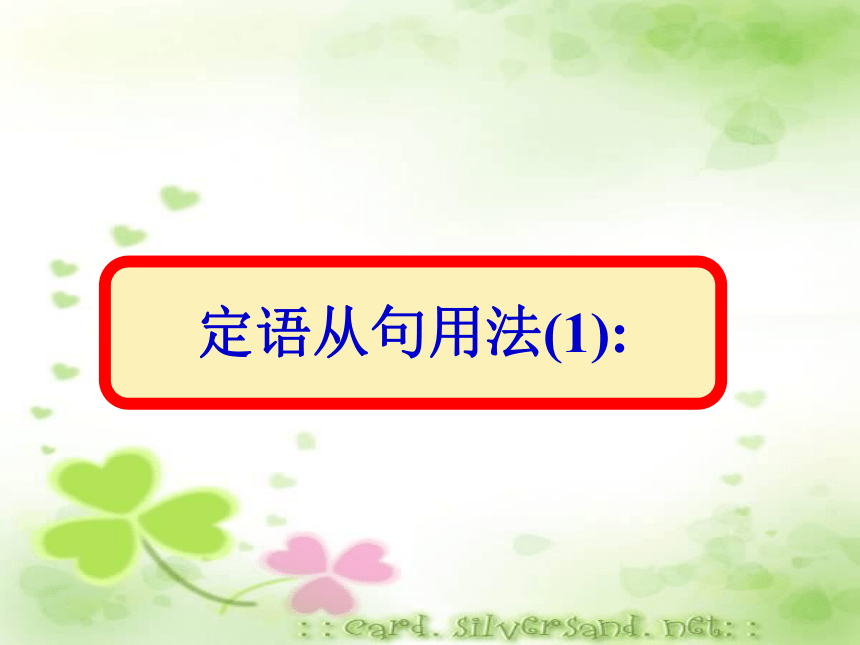
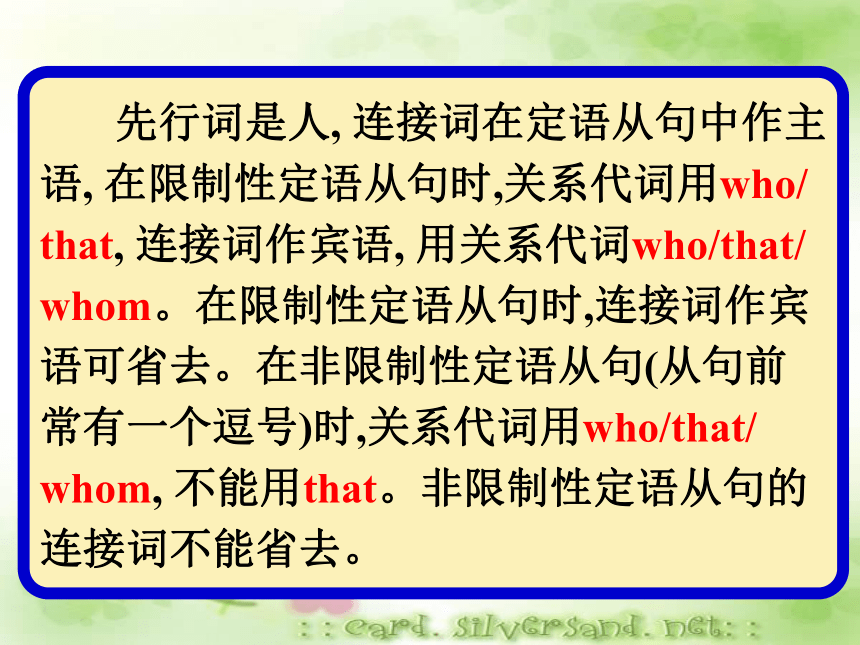
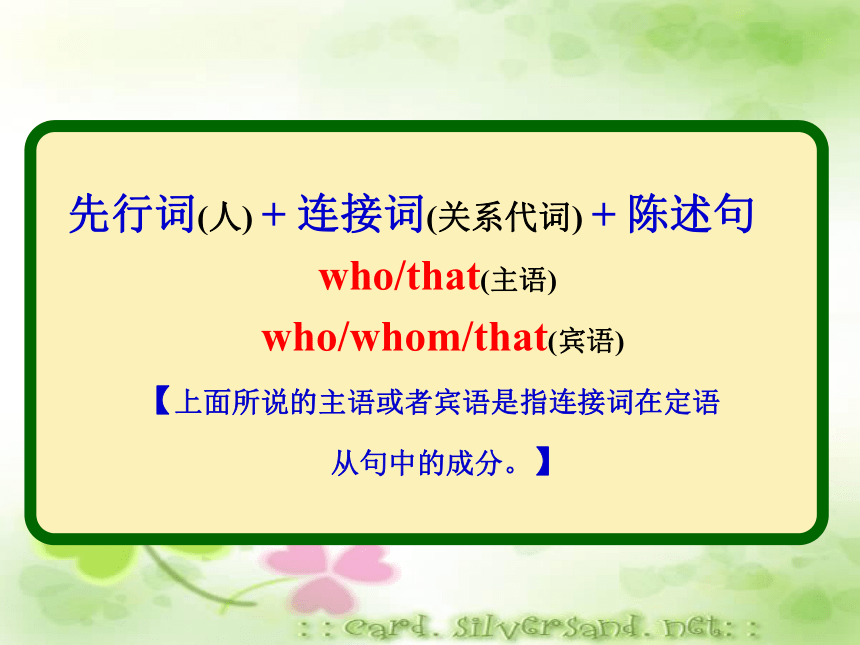
文档简介
(共157张PPT)
英语高考必考语法
定语从句
The Attributive Clause
在主从复合句中, 有连词
的句子叫从句。
从句: 连词 + 陈述句
定语从句
(在主从复合句中从句作定语)
定语从句的句式是:
名词/代词/句子 + 连词 + 陈述句
【定语从句 】
定语从句对从句前的名词/代词/
句子进行修饰、限制。
同位语从句对从句前的名词进行解释或者说明。从句往往是前面名词的具体内容。同位语从句的句式是:
名词 + 连词 + 陈述句
定语从句的连接词有who (代人), whom (代人),
that (代物/人), which (代物/句子), as (代物/句子), when (代时间) , where (代地方) , whose (某人/某物的), why (在reason后)。以上词在定语从句中要充当成分。
同位语从句的连词有: that (用得最多。that起连接作用, 没有意思,在从句中不作成分, 不能省去。);在idea, question, problem, doubt 等名词后可以用特殊疑问词(which, who, whom, when, where, whose, why, how)和whether引导同位语从句, 这些特殊疑问词和whether在同位语从句中的意思就是它们的本身意思。
同位语从句和定语从句的连接词虽然大致相同, 但用法和意思完全不一样。
被定语从句修饰、限制的词叫先行词, 定语从句的引导词叫关系代词或关系副词。
1)We don’t believe the story that he
killed 190 German soldiers in
the war. (同位语从句)
2)We don’t believe the story that he told
me yesterday. (定语从句)
【第1)句的that句子解释前面的story, 是story的具体
内容,是同位语从句, that 无意思, 起连接作用, 不能
省去; 第2)句的that 句子修饰限制前面的story, 是定
语从句, that 代前面的story, 在定语从句中作宾语,
可以省去。】
3)The news that China has won three gold
medals in the Winter Olympic
Games is true. (同位语从句)
4)The news that she heard this morning
is true. (定语从句)
5)The worker has solved the problem
why the machine didn’t work yesterday. (同位语从句)
6)The reason why the machine didn’t
work yesterday is quite clear. (定语从句)
定语从句用法(1):
先行词是人, 连接词在定语从句中作主语, 在限制性定语从句时,关系代词用who/
that, 连接词作宾语, 用关系代词who/that/
whom。在限制性定语从句时,连接词作宾语可省去。在非限制性定语从句(从句前常有一个逗号)时,关系代词用who/that/
whom, 不能用that。非限制性定语从句的连接词不能省去。
先行词(人) + 连接词(关系代词) + 陈述句
who/that(主语)
who/whom/that(宾语)
【上面所说的主语或者宾语是指连接词在定语
从句中的成分。】
The man lives on the 11th floor. The man is a driver.
1)The man lives on the
11th floor is a driver.
She is going to marry Jim.
She does not love Jim at all.
2)She is going to marry Jim _________
she does not love at all.
who/that
who/whom/that
3)The dogs were well trained by their
masters had great experience with caring for these animals.
4)But Sarah, has taken part in
shows along with top models , wants to prove that she has
brains as well as beauty.
who/that
who
5)Some people think that the great
Chinese scholar Confucius, ______ lived from roughly 551 to 479
B.C., influenced the development
of chopsticks.
6)The stars, we should worship, are scientists and doctors.
who
who/whom
7)He will not learn when
he is young will regret it when he
is old.
8)He doesn’t reach the
Great Wall is not a true man.
9)He laughs last laughs
longest.
10)I, your good friend, will
try my best to help you out.
who/that
who/that
who/that
who am
定语从句用法(2):
先行词是物, 连接词在定语从句中作主语或者宾语,在限制性定语从句时,关系代词用that/which, 连接词作宾语时可省去。在非限制性定语从句时,关系代词作主语/宾语均用which,不可用that, 非限制性定语从句的连接词不能省去。
先行词(物) + 连词(关系代词) + 陈述句
that/which(主语/宾语)
The films were made in the 1960s.
We will see the films next year.
1)→Next year we will see the films
were made in the 1960s.
The cellphone still works well.
My uncle bought the cellphone in 2014.
2)→The cellphone my
uncle bought in 2014 still works
well.
that/which
(that/which)
3)A plane is a machine can fly.
4)The picture-book you
borrowed from the library yesterday is really interesting.
5)The factories make computers are far from the city center.
6)Football is a game is liked by many people in South America.
that/which
that
that/which
that/which
7)The little problems we
meet in our daily lives may be inspirations for great inventions.
8)She likes the novels were
written by Ba Jin.
9)The letter I received the other day was from my aunt.
10)I refuse to accept the blame for something was someone else’s fault.
that
that/which
that/which
that/which
定语从句用法(3):
先行词是时间, 连接词在定语从句中作状语, 关系副词用when。连接词在定语从句里作主语或者宾语, 如果是限制性定语从句, 用关系代词that/which;如果是非限制性定语从句, 用关系代词which。
①先行词(时间) + 连词(关系副词) + 陈述句
when(状语)
②先行词(时间) + 连词(关系代词) + 陈述句
that/which(主语/宾语)
此种用法的定语从句的when可
以根据它所代替的时间改为
at/on/in which。
My grandmother was born in 1931. The Anti-Japanese War broke out
in 1931.
1)→My grandmother was born in 1931
the Anti-Japanese War broke out.
when
in which
We will put off the picnic in the park
until next week.
The weather may be better next week.
2)→ We will put off the picnic in the
park until next week, the weather may be better.
when
We will never forget the years.
We worked together in the countryside
in those years.
3)→We will never forget the years
we worked together in
the countryside.
when
We will never forget the years.
We spent the years together in the
countryside.
4)→We will never forget the years
we spent together
in the countryside.
5)That evening, I will tell you more about later, I ended up working very late.
(that/which)
which
6)As the smallest child of his family,
Alex is always longing for the
time he should be able
to be independent.
7)I am looking forward to the day
my daughter can read this book and know my feelings
for her.
8)The time I first met Nelson
Mandela was a very difficult
period of my life.
when
when
when
9)Vladimir Putin came to power in May, 2012, since he has taken
a lot of measures to improve Russia’s economy.
10)We have entered into an age ______
dreams have the best chance of coming true.
11)There are other times giving
first aid can save lives.
when
when
when
12)By 16:30, was almost
closing time, nearly all the paintings had been sold.
13)In the years followed, they built seven schools and two hospitals in Africa.
which
that
定语从句用法(4):
先行词是地方, 连接词在定语从句中作状语, 关系副词用where。连接词在定
语从句里作主语或者宾语, 如果是限制性定语从句, 用关系代词that/which;如果是
非限制性定语从句, 用关系代词which。
①先行词(地方) + 连词(关系副词) + 陈述句
where(状语)
②先行词(地方) + 连词(关系代词) + 陈述句
that/which(主语/宾语)
此种用法的定语从句的where可
以根据它所代替的地方改为
at/on/in which。
They will fly to Washington.
They plan to stay in Washington for
two or three days.
1)→They will fly to Washington,
they plan to stay for
two or three days.
where
They will fly to Washington. Washington lies in the northeast of
the USA.
2)→They will fly to Washington
lies in the northeast
of the USA.
that/which
3)Many countries are now setting up national parks animals
and plants can be protected.
4)Finally he reached a lonely island
was completely
cut off from the outside world.
5)The girl arranged to have piano
lessons at the training center with her sister she would stay for an hour.
that/which
where
where
6)Self-driving is an area China
and the rest of the world are on
the same starting line.
7)When I arrived, Bryan took me to see
the house I would be staying.
8)The old town has narrow streets and small houses are built close to each other.
where
where
that/which
9)He wrote a letter he explains
what had happened in the accident.
10)Nowadays people are more
concerned about the environment
they live.
11)There are dirty marks on her trousers
she had wiped her hands.
12)We are going to spend the Spring Festival in Guangzhou, live
my grandparents and some relatives.
where
where
where
where
where引导定语从句时,前面不加
介词, 但from where是例外:
1)She stood near the window, from
where she could see the whole park.
2)He drove back to the place from
where the brick had been thrown.
3)They live on the mountain from
where they can see the whole city.
4)We will have a rest under the tree,
from where we can have a wonderful view of the city below.
5)It can be difficult if the only disabled
toilet is in the basement a long way from where the film is showing.
6)China is the birthplace of kites, from
where kite-flying spread to Japan, Korea, Thailand and India.
7)From where we were standing, we
could see the TV tower clearly.
(此句划线部分是状语)
定语从句用法(5):
先行词是物(地方)或者人时, 表示 “某人的; 某物的” 意思时, 连接词用
whose。
先行词(物/人) + 连接词(关系代词) + 陈述句
whose
Do you know the student His/Her father works at the
police station.
1)→Do you know the student _______
father works at the police station
whose
The school shop is closed for
the holidays.
The school shop’s customers are
mainly students.
2)→The school shop, customers
are mainly students, is closed for
the holidays.
whose
3)The villagers rushed over to help the
man car had broken down.
4)That’s the new machine __________
parts are too small to be seen.
5)The boss donated 3 million dollars to
the children parents died
in the 2008 earthquake.
6)Last year I bought an ancient Chinese
vase price is very reasonable.
whose
whose
whose
whose
7)On the wall hangs a picture, _______
color is blue.
8)His parents wouldn’t let him marry
anyone family was too poor to buy an apartment.
9)My eldest son, work takes him all over the world, is in New York at the moment.
10)A company profits from home markets are declining may seek opportunities abroad.
whose
whose
whose
whose
11)I decided to write about Chaplin,
one of films I had seen several years before.
12)Our English teacher, with ________
help we have made great progress
in English, has completed forty
years of teaching.
(with one’s help)
whose
whose
13)The people, in village I
taught 28 years ago, are living a good life.
(in one’s village)
14)On May 12,2008, an earthquake
struck/hit some areas in West
China, from effects
the people there are still suffering.
(suffer from)
whose
whose
15)In the police station, I saw the man
from room the thief
had stolen lots of valuable things.
16) In 1963 the UN set up the World Food Programme, one of _______
purposes is to relieve worldwide starvation.
whose
whose
定语从句用法(6):
先行词是人, 定语从句前有介词时,
关系代词用whom; 先行词是物, 定语
从句前有介词时, 关系代词用which。
先行词(人) + 介词(whom) + 陈述句
先行词(物) + 介词(which) + 陈述句
常这样用的介词有:
of (...的) in on at about with without for to after above
The animal is a tiger.
The scientists are interested in the tiger.
1)→The animal the
scientists are interested in is
the tiger.
2)→The animal in the scientists
are interested is the tiger.
that/which
which
The expert is from Europe.
My father is talking with the expert.
3)→The expert my
father is talking with is from Europe.
4)→The expert with my father
is talking is from Europe.
who/whom/that
whom
5)Mr. Black is the person____________
you should write to at once.
6)Mr. Black is the person to you
should write at once.
7)In the street there is nobody_________
I can turn to for help.
8)In the street there is nobody to_______
I can turn for help.
who/that/whom
whom
whom
9)Luckily, we had brought a road map,
without we would
have lost our way.
10)The clever boy made a hole in the
wall, through he could see what was going on inside the house.
11)The two things they felt
very proud are Jim’s gold watch and Della’s hair.
which
which
of which
12)The number of people this
happens is not very large.
13)At the dark square, there wasn’t a
single person she could turn for help.
14)By nine o’clock, all the students had reached the top of the mountain,
appeared a rare rainbow soon.
to whom
to whom
above which
15)Gun control is a subject ___________
Americans have argued for a
long time.
16)However, Mr. Gates, the
ancient vase belonged, decided to donate it to the British Museum.
17)The knife he used to
cut apples is very sharp.
18)She was educated at the local high
school, she went on to Cambridge University.
to whom
after which
with which
above which
注意: 以下动词短语look after, look at,
look into, break into, be made of,
make use of, take part in, get rid of,
take/catch hold of, get along/on with,
catch/keep up with, look forward to,
listen to, depend on, pay attention to,
take care of, look for, wait for 等一般
不能拆开, 换句话说就是不能把介词提到
定语从句之前。
定语从句用法(7):
名词/数词/ some/many/most/
all/both/none/neither/each/few/
any/several/either/half +
of which(代物) /whom(代人) …
= of which/whom + 名词/数词/
some/many/most/
all/both/none…
【这种用法实际上和第6种用法属同一类型】
1)Last week, two people came to look
at the house, both of__________ wanted to buy it .
2)She brought with her three friends,
none of I had met before.
3)I have eight close friends, one of
is a farmer.
4)I have eight close friends, two/some/
all of are farmers.
5)The old man has two sons, the older
of is a general.
whom
whom
whom
whom
whom
6)There are lots of computers at the
exhibition, any of will suit you perfectly.
7)I have five English dictionaries, one of
is very expensive.
8)I have five English dictionaries, two/
some/all of are expensive.
9)China has a lot of islands, the largest
of is Taiwan.
which
which
which
which
10)The house, the wall of was
destroyed in the quake, has been repaired.
11)The house, wall was
destroyed in the quake, has been repaired.
12)She has a big clock, the hands(针) of
are made of gold.
13)She has a big clock, hands
are made of gold.
which
which
whose
whose
14)Scientists have advanced many
theories about why human beings cry tears , none of has been proved.
15)Many young people, most of_______ were well-educated, headed for very remote regions to chase their dreams.
16)He wrote many children’ s books, nearly half of were published in the 1990s.
which
whom
which
17)John invited about 40 people to his
wedding, most of are family members.
18)The children, all of had played the whole day long, were worn out.
19)The newly built café, the walls of
are painted light green, is really a peaceful place for us, especially after hard work.
whom
whom
which
20)English is a language shared by several diverse cultures, each of
uses it somewhat differently.
21)Maria has written two novels, both
of have been made into television series.
which
which
22)There were two small rooms in the
house, the smaller of_________ served as kitchen.
23)The journey around the world took
the old sailor nine months,
the sailing time was 215 days.
24)I was given four books on teaching,
the first I really liked.
25)There were 290 passengers on board,
of 143 were drowned.
of which
which
of which
whom
26)There are 60 students in Class 9,
two thirds are from
the countryside.
27)In our class there are 52 students,
half wear glasses.
28)She showed the visitors around the
stadium, the construction
had taken more than three years.
(whose construction)
of whom
of whom
of which
定语从句用法(8):
复杂介词 + 关系代词(which, whom):
常常这样用的复杂介词有:
as a result of, because of,
at the back of, in front of,
in the middle of, at the bottom of,
on the top of, at the foot of…
1)There is a great pain in my right foot,
because of I can only
walk in this way.
2)They arrived at a farmhouse, in front
of sat an old woman.
3)At last we reached the mountain, on
the top of stands a
TV tower.
which
which
which
4)At last we reached the mountain, at
the foot of are lots of villas(别墅).
5)This morning I saw a man in the
street, on the head of stood
a monkey.
whom
which
定语从句用法(9):
介词 + which + 名词......:
during which time/period:
在那段时间期间
at which time/moment: 在那时
by which time: 到那时
in which case: 假如/如果那样的话
at which temperature: 在那个温度
【which: 关系限定词, 可译为: 这; 那】
1)Mark was a student at Yale University
from 2017 to 2021, during which time he studied very hard.
(定语从句)
●Mark was a student at Yale University
from 2017 to 2021. During that time he studied very hard.
(不是定语从句)
2)The man comes here at 6:00 p.m. every
day, at which time we are usually playing basketball.
3)Telephone me at 8:00 am, by which
time I will have received the information.
4)These questions are on how the
universe came into being, about which subject I know nothing.
5)He may win the competition, in which
case he is likely to get into the national team.
6)Last year my brother lived in the UK
for nine months, during which time he learned a lot of English.
7)Water boils at 100℃, at which
temperature it changes into gas.
8)She was about to go to work, at which
moment it began to rain hard.
9)David stayed in the United States
from 2016 to 2020, during which period he studied law/medicine.
定语从句用法(10):
which 代主句或主句的一部分
所引导的定语从句:
主句, which定语从句..........
1)Helen was much kinder to her
youngest son than to the others ,
, of course , made the
others envy him.
2)Kate has made great progress this
term, shocks her mom.
3)They’ve won their last three matches,
I find a bit surprising.
4)Betty always tells lies, we
find strange.
which
which
which
which
5)My parents treat me just like a baby,
I cannot bear.
6)She and her family bicycle to work,
helps them keep fit.
7)China Today attracts a worldwide
readership, shows
that more and more people all
over the world want to learn
about China.
which
which
which
8)Now, we have raised 50,000 pounds
for the poor children, is quite unexpected.
9)Mo Yan was awarded the Nobel Prize for Literature in 2012, _________ made one of the Chinese people’s long-held dreams come true.
10)We have launched another man-made satellite, is announced in today’s newspaper.
which
which
which
11)After graduating from college,I took
some time off to go travelling,
turned out to be a wise decision.
12)It is the third time that she has won
the race, has surprised us all.
13)The skyscraper will reach a height
of 700 meters, is said
to be the highest building around
the world.
which
which
which
定语从句用法(11):
as 代主句或主句的一部分所引导的定
语从句: as定语从句可以在主句前, 主句
中间, 主句后。定语从句在句首时; 定语从句是被动结构时; 定语从句含有 “正如;
像;如像” 等意义时,关系代词用 as。as在定语从句中可以作主语、宾语或表语。
下两页是一些常见的as定语从句。
as we/I know: 正如我们/我所知
as is known to all/us: 众所周知
as we/I/anyone can see:
正如我们/我/任何人能看到的
as is usual: 像往常一样
as is (often) the case: 情况(常常)就是这样;
常有的事
as the saying goes: 常言道; 俗话说;
谚语说; 正如谚语/俗话所说
as indeed it is: 事实上也确实如此
as often happens: …经常/常常发生
as you/I/we expect: 如你/我/我们所料
as is said: 据说
as has been said before/above:
如上所说/述
as is mentioned above: 正如上面提到的
as is reported: 像/正如报道的那样
as is announced: 像宣布的那样
as is hoped: 正如所希望的
as can/may be imagined: 可以想象到
as can be seen: 像看见的那样
as has been pointed out: 正如已经指出的
1)As is said/reported, their prime minister
has tested positive for Covid-19.
2)As has been mentioned above, the
bridge was built in 1600.
3)As we know, British English is a little
different from American English.
4)“You can’t judge a book by its cover,”
as the old saying goes.
5)As is the case, we have worked out
the production plan.
6)As is often the case with children,
Amy was better by the time the doctor arrived.
7)The number of smokers, as is reported,
has dropped by 17 percent in the past one year.
8)There is no simple answer, as is often the case in science.
9)The air quality in the city, as is shown
in the report, has improved over
the past two months.
10)A lot of language learning, as has
been discovered, is happening in
the first year of life, so parents should talk much to their children during that period.
11)The earth, as we know, moves/goes/
travels around the sun.
12)As was explained at the last meeting, we will have to double our sales
in the next two years.
定语从句用法(12):
but式定语从句:
but = who/that …not
1)There is no mother but loves her own children.
=There is no mother who does not
love her own children.
2)In our unit there is no one but wants
to help you live through the winter.
=In our unit there is no one who
doesn’t want to help you
live through the winter.
3)There is no student in the class but hopes to study English well.
=There is no student in the class
who doesn’t hope to study English well.
4)There is no man but feels pity for the starving people in Afghanistan.
= There is no man who doesn’t feel
pity for starving people in Afghanistan.
5)There is no rule in a language but has
exceptions.
=There is no rule in a language
that has no exceptions.
6)With the help of the computer, there is
no problem but can be solved
in a few hours.
=With the help of the computer,
there is no problem that can’t
be solved in a few hours.
定语从句用法(13):
定语从句被省去主语和部分谓语
1)She had only 3 pounds with which
she could buy him a present.
She had only 3 pounds with which
to buy him a present.
2)The twenty workers have only two
small rooms in which they
can live.
The twenty workers have only two
small rooms in which to live.
3)Frank’s dream was to have his own
factory in which he could produce things with his own hands.
Frank’s dream was to have his own
factory in which to produce things with his own hands.
4)My dream is to have a large farm on
which I can grow lots of wheat.
My dream is to have a large farm on which to grow lots of wheat.
5)He wants to find a person here with
whom he can have a talk.
He wants to find a person here with
whom to have a talk.
6)The farmers use wood to build a
house in which they can store
grain.
The farmers use wood to build a
house in which to store grain.
定语从句用法(14)
限制性和非限制性定语从句:
限制性定语从句对先行词起限制、确定的作用, 是先行词不可或缺的定语, 如果省去,主句的意思就不完整、不确定或者不合逻辑,有时甚至于引起费解或误解。限制性定语从句和主句之间不能用逗号隔开。
非限制性定语从句和先行词或主句关系
松散,只是对先行词或主句起补充说明作用,
如果省去,主句的意思仍然完整和清楚。非
限制性定语从句和主句之间须用逗号隔开。
同样的主从复合句,含的是限制性定语
从句和含的是非限制性定语从句有时在意
思上略有不同。
非限制性定语从句的连接词不能是that
和why, 其余情况的连接词与限制性定语从
句相同。非限制性定语从句的连接词通常
不能省去。
①先行词(人), who/whom......................
(who主语/宾语, whom宾语)
②先行词(物/句子), which ....................
③先行词(时间), when...........................
④先行词(地方), where .........................
⑤先行词(物/人), whose........................
⑥先行词(人),介词 + whom................
⑦先行词(物),介词 + which ................
⑧先行词(reason), for which................
⑨as定语从句
1)The book tells us about Alexander
Fleming, discovered
penicillin.
2)The Science Museum, we
built last month, is one of London’s tourist attractions.
3)Later, the medicine was tested on
malaria patients, most of _______ recovered.
who
which
whom
4)Afterwards, Einstein had to flee Germany, Hitler was in power.
5)There is nothing we can do to help Linda, circumstances are beyond our control.
6)Between the two parts of the concert
is an interval, the audience can buy ice-cream.
where
whose
when
7)Tu Youyou was awarded the Nobel
Prize, is considered
one of the highest international
honours.
8)The factory makes 150 ships every
year, 80% of are sold abroad.
9) has already been pointed out
by the teacher, grammar is not
a set of dead rules.
which
which
As
10)Her father, has lots of money, wishes her to go abroad for her further study.
11)Mr. Horse, is my boss, will fly to China for a business meeting.
who
who
限制性和非限制性定语从句区别的例子:
1)People who/that often take physical
exercise live longer.
经常进行体育锻炼的人活得长些。
(若把从句去掉, 句子就失去意义)
2)His son, who is in France now, is
coming home next month.
他儿子下个月回国, 目前他在法国。
(若把从句去掉, 句子意义仍然完整)
3)This is the dictionary that you want.
这是你想要的词典。
4)Yesterday my aunt bought me a
dictionary, which is very useful.
我阿姨昨天给我买了本词典, 很有用。
5)I have two sisters who are nurses.
我有两个当护士的妹妹。
(不只两个妹妹)
6)I have two sisters, who are nurses.
我有两个妹妹, 她们是当护士的。
(只有两个妹妹)
7)His daughter who studied abroard
works in Hongkong now.
他留过学的那个女儿现在在
香港工作。 (不只一个女儿)
8)His daughter, who studied abroard,
works in Hongkong now.
他女儿现在在香港工作, 她
之前留过学。 (只有一个女儿)
9)In the dining-hall there are ten chairs
that are made of wood.
在餐厅里有10张木制的椅子。
(隐含的意思是: 餐厅里有很多椅子, 其中有10张是木制的)
10)In the dining-hall there are ten chairs,
which are made of wood.
在餐厅里有10张椅子, 是木制的。
(隐含的意思是: 餐厅里只有10张椅子)
11)She will wear no clothes which will
make her different from others.
她不会穿一些与众不同的衣服。
(which代clothes)
12)She will wear no clothes,which will
make her different from others.
她不穿衣服, 这会使她显得与众不同。
(which代整个主句)
使用定语从句的
六大注意点:
1. 先行词为 business, family, activity, race, game, job, work, position, stage, atmosphere, situation, circumstance, case, stage, spot, point(地点)等, 连接词在定语从句作状语时, 定语从句常用关系副词where引导。
1)I work in a business where/(in which)
almost everyone is waiting for a great chance.
(business: 职业,行业, 企业,公司,商店)
2)All the neighbors admire this family where/(in which) the parents are treating their child like a friend.
3)Those successful deaf dancers think that dancing is an activity where sight matters more than hearing.
4)Life is like a long race where we compete with others to go beyond ourselves. (比赛)
5)I find teaching fun and challenging. It
is a job where you are doing something serious but interesting.
6)The book has helped me greatly in my daily communication, especially at work where a good impression is a must.
7)Sales director is a position where
communication ability is just as
important as sales. (职务; 职位)
8)The boss of the company is trying to
create an easy atmosphere where
his employees enjoy their work.
9)Their child is at the stage where she
can say individual words but not
full sentences. (阶段)
2. 先行词为stay(停留;逗留), occasion(时机; 时
间), incident(事件), point(时间)等,连接词在定语从句作状语时,定语从句常用关系副词when引导。
1)She’ll never forget her stay there
when she found her missing son.
2)Occasions are quite rare when I have
the time to spend holidays with
my family.
3)Maybe the disappearance of the
dinosaur came after an unexpected incident when a huge rock from space hit the earth and put too much dust into the air.
4)Will there be a point/time when I can
get 20,000 dollars a month
5)Today I will go on with the story at
the point where the hero is about to rescue the girl.
【第5)和第6)两句point的意思是 “地点”。
第6) 的point也可以看作时间。 】
6)We have come to a point (at which)/
where/when we must decide what to do in the future.
3. 先行词是someone/somebody, anyone/
anybody, everyone/everybody, nobody, all, one, ones 等指人时, 定语从句关系代词用that(主语/宾语), who (主语/宾语),
whom(宾语)。
1)I will tell the good news to everyone
that/who will take the exams
next year.
2)Anyone (that/who/whom) you
mentioned just now will be given three English novels
tomorrow afternoon.
4.先行词为 that 指物时, 定语从句用
which; 先行词为those 指物时, 定语从
句用which/that; 先行词为those指人时, 定语从句可以用who/that, who更常见。
1)What was that which you saw in the
sky last night
2)What are those which she wants to
reread
3)You must find those that/which may
attract top scientists.
4)Those who/that want to fly to Tokyo
must sign here after the party.
5)God will punish those who/that have
done bad deeds.
5.定语从句常用that的情况:
①名词前有最高级, 序数词时;
②all, some, much, little, few, none, everything,
anything, nothing, something等指物时;
③先行词前有all, every, some, any, no, little,
much, few, one, the only/very/right/last/next时,
当先行词指人时, 偶尔也可用关系代词who;
④先行词既有人又有物时;
⑤ There be + 物 + that ….;
【There be + 人 + who …】
⑥ 复合句中有两个定语从句, 前句已有which时,
后句用that;
⑦ 关系代词在限制性定语从句中作表语, 并带
有比较的含义时;
⑧ 主句是who, what, which开头的特殊问句时。
1)This is the most spectacular Olympic
opening ceremony that I have
ever watched.
2)The first/third/last English novel that
I read was “ The Adventures of Tom Sawyer” by Mark Twin.
3)He is the first/second person that has passed the driving test today.
4)The woman told us all that she had
seen in America.
5)Please tell the students something
that you know about the Chinese Dream.
6)Finally, the thief handed everything
that he had stolen to the police.
7)Is there anything that I can do for my
motherland
8)There is nothing that can stop us from
recovering Taiwan.
9)They are the only/very animals that
live on the island.
10)Barbara is easy to recognize as she’s
the only woman that wears an evening dress.
11)He is the only one of the farmers who/that lives in the valley.
12)He is one of the farmers who/that live
in the valley.
13)All the farmers who/that are present
at the meeting will get some
books about agriculture.
14)Please send us all the information
that you have about the candidate for the position.
15)They will talk about the plants and
the people that they saw in Tibet.
16)When they met again, the two friends talked about lots of things and persons that they could remember
in the school.
17)In the pond there are plenty of fishes
that are eating something happily.
18)There are nine teachers in the office who are preparing lessons.
19)My cousin will sell the house which was built in 2013 that stands at
the foot of the mountain.
20)Who is the hero that has saved the
two boys in the cold river
21)Which is the bridge that the workers built last year
22)Our country is no longer the country that it was 25 years ago.
6. 几种固定结构的定语从句:
以下情况连接词在定语从句中作状语时才这么用;
如连接词作主语或者宾语,那么就该用that/which。
先行词(way方法/方式) + in which/that/不用连词
先行词(manner方法) + in which
先行词(means方法) + by which
先行词(method方法) + by/with which
先行词(situation情况) + in which/where
先行词(case情况) + in which/where
先行词(condition状况) + in which/where
先行词(business) + in which/where
先行词(point地方) + at which/where
先行词(point时间) + when
先行词(reason理由/原因) + why/for which
(非限制性定语从句用for which)
先行词(trend趋势) + in which
先行词(occasion时间) + in which/when
the same…... as…...: 与...一样
(表示同一类, 即相同的另外的物。定语从句为省略结构时要用as;
the same后无名词时要用as)
the same….. that….: (表示同一, 即原人/原物)
the same… where…: (表示同一地方,where在定语从句作状语)
【the same….. that….: 表示同一。 但现在也有这种说法:
the same...as...可以表示同类, 也可表示同一。】
such …..... as…...... : 像...那样的
as .............. as......... :
1)It’s helpful to put children in a situation where they can see themselves differently.
2)Now we can see clearly the method
by which the machine works.
3)I can think of many cases where students obviously knew a lot of English words and expressions
but couldn’t write a good essay.
4)Can you think of a situation/case/
condition people are busy fighting a forest fire
5)Dr. Foster thinks that any trend in which the temperature increases by 5 degrees would lead to a catastrophe.
in which/where
6)The reason why/(for which) they missed the train was that their
car broke down on the way to the station.
7)This is the reason that she gave us for her absence from the lecture.
8)Do you know the reason why/(for
which) the athlete wants to
represent China in the Winter
Olympic Games
9)I don’t like the way (in which)/that
you treat your children.
10)Mr. Brown has a gift for explaining mathematical concepts in ways that make them seem clear and obvious. (that主语)
11)He lives in the same village as his
uncle and aunt. (没有定语从句)
12)Your answer is the same as hers.
(没有定语从句)
13)They have made the same mistake
as last time. (没有定语从句)
14)They have made the same mistake
that they made last time.
15)She is wearing the same sweater as I lost last winter. (as宾语)
16)She is wearing the same sweater that
I lost last winter.
17)He has bought the same cellphone as is on the table. (as主语)
18)This is the (same) monkey that I saw in the forest 20 minutes ago.
19)This is the (same) girl that we met in in the forest 20 minutes ago.
20)This is the (same) bookstore where
we bought the English-Chinese dictionary.
21)My grandpa often tells me the same story as/that he told me ten years ago.
22)They have the same difficulty that/as you had last year.
【这两句 定语从句前是抽象名词,
用as/that均可以】
23)They will see such films as were shown at the cinema last Tuesday.
(as主语)
24)Don’t trust such people as praise you to your face but speak ill of you behind your back. (as主语)
25)The student made as much progress
as we had expected. (as宾语)
26)In the school library you can borrow as many books as you want.
(as宾语)
27)As many children as came to my
wedding were given some
gifts. (as主语)
28)He is such a good boy as we all like.
(定语从句, as宾语)
29)He is such a good boy that we all like him. (结果状语从句)
Thanks for your watching !
英语高考必考语法
定语从句
The Attributive Clause
在主从复合句中, 有连词
的句子叫从句。
从句: 连词 + 陈述句
定语从句
(在主从复合句中从句作定语)
定语从句的句式是:
名词/代词/句子 + 连词 + 陈述句
【定语从句 】
定语从句对从句前的名词/代词/
句子进行修饰、限制。
同位语从句对从句前的名词进行解释或者说明。从句往往是前面名词的具体内容。同位语从句的句式是:
名词 + 连词 + 陈述句
定语从句的连接词有who (代人), whom (代人),
that (代物/人), which (代物/句子), as (代物/句子), when (代时间) , where (代地方) , whose (某人/某物的), why (在reason后)。以上词在定语从句中要充当成分。
同位语从句的连词有: that (用得最多。that起连接作用, 没有意思,在从句中不作成分, 不能省去。);在idea, question, problem, doubt 等名词后可以用特殊疑问词(which, who, whom, when, where, whose, why, how)和whether引导同位语从句, 这些特殊疑问词和whether在同位语从句中的意思就是它们的本身意思。
同位语从句和定语从句的连接词虽然大致相同, 但用法和意思完全不一样。
被定语从句修饰、限制的词叫先行词, 定语从句的引导词叫关系代词或关系副词。
1)We don’t believe the story that he
killed 190 German soldiers in
the war. (同位语从句)
2)We don’t believe the story that he told
me yesterday. (定语从句)
【第1)句的that句子解释前面的story, 是story的具体
内容,是同位语从句, that 无意思, 起连接作用, 不能
省去; 第2)句的that 句子修饰限制前面的story, 是定
语从句, that 代前面的story, 在定语从句中作宾语,
可以省去。】
3)The news that China has won three gold
medals in the Winter Olympic
Games is true. (同位语从句)
4)The news that she heard this morning
is true. (定语从句)
5)The worker has solved the problem
why the machine didn’t work yesterday. (同位语从句)
6)The reason why the machine didn’t
work yesterday is quite clear. (定语从句)
定语从句用法(1):
先行词是人, 连接词在定语从句中作主语, 在限制性定语从句时,关系代词用who/
that, 连接词作宾语, 用关系代词who/that/
whom。在限制性定语从句时,连接词作宾语可省去。在非限制性定语从句(从句前常有一个逗号)时,关系代词用who/that/
whom, 不能用that。非限制性定语从句的连接词不能省去。
先行词(人) + 连接词(关系代词) + 陈述句
who/that(主语)
who/whom/that(宾语)
【上面所说的主语或者宾语是指连接词在定语
从句中的成分。】
The man lives on the 11th floor. The man is a driver.
1)The man lives on the
11th floor is a driver.
She is going to marry Jim.
She does not love Jim at all.
2)She is going to marry Jim _________
she does not love at all.
who/that
who/whom/that
3)The dogs were well trained by their
masters had great experience with caring for these animals.
4)But Sarah, has taken part in
shows along with top models , wants to prove that she has
brains as well as beauty.
who/that
who
5)Some people think that the great
Chinese scholar Confucius, ______ lived from roughly 551 to 479
B.C., influenced the development
of chopsticks.
6)The stars, we should worship, are scientists and doctors.
who
who/whom
7)He will not learn when
he is young will regret it when he
is old.
8)He doesn’t reach the
Great Wall is not a true man.
9)He laughs last laughs
longest.
10)I, your good friend, will
try my best to help you out.
who/that
who/that
who/that
who am
定语从句用法(2):
先行词是物, 连接词在定语从句中作主语或者宾语,在限制性定语从句时,关系代词用that/which, 连接词作宾语时可省去。在非限制性定语从句时,关系代词作主语/宾语均用which,不可用that, 非限制性定语从句的连接词不能省去。
先行词(物) + 连词(关系代词) + 陈述句
that/which(主语/宾语)
The films were made in the 1960s.
We will see the films next year.
1)→Next year we will see the films
were made in the 1960s.
The cellphone still works well.
My uncle bought the cellphone in 2014.
2)→The cellphone my
uncle bought in 2014 still works
well.
that/which
(that/which)
3)A plane is a machine can fly.
4)The picture-book you
borrowed from the library yesterday is really interesting.
5)The factories make computers are far from the city center.
6)Football is a game is liked by many people in South America.
that/which
that
that/which
that/which
7)The little problems we
meet in our daily lives may be inspirations for great inventions.
8)She likes the novels were
written by Ba Jin.
9)The letter I received the other day was from my aunt.
10)I refuse to accept the blame for something was someone else’s fault.
that
that/which
that/which
that/which
定语从句用法(3):
先行词是时间, 连接词在定语从句中作状语, 关系副词用when。连接词在定语从句里作主语或者宾语, 如果是限制性定语从句, 用关系代词that/which;如果是非限制性定语从句, 用关系代词which。
①先行词(时间) + 连词(关系副词) + 陈述句
when(状语)
②先行词(时间) + 连词(关系代词) + 陈述句
that/which(主语/宾语)
此种用法的定语从句的when可
以根据它所代替的时间改为
at/on/in which。
My grandmother was born in 1931. The Anti-Japanese War broke out
in 1931.
1)→My grandmother was born in 1931
the Anti-Japanese War broke out.
when
in which
We will put off the picnic in the park
until next week.
The weather may be better next week.
2)→ We will put off the picnic in the
park until next week, the weather may be better.
when
We will never forget the years.
We worked together in the countryside
in those years.
3)→We will never forget the years
we worked together in
the countryside.
when
We will never forget the years.
We spent the years together in the
countryside.
4)→We will never forget the years
we spent together
in the countryside.
5)That evening, I will tell you more about later, I ended up working very late.
(that/which)
which
6)As the smallest child of his family,
Alex is always longing for the
time he should be able
to be independent.
7)I am looking forward to the day
my daughter can read this book and know my feelings
for her.
8)The time I first met Nelson
Mandela was a very difficult
period of my life.
when
when
when
9)Vladimir Putin came to power in May, 2012, since he has taken
a lot of measures to improve Russia’s economy.
10)We have entered into an age ______
dreams have the best chance of coming true.
11)There are other times giving
first aid can save lives.
when
when
when
12)By 16:30, was almost
closing time, nearly all the paintings had been sold.
13)In the years followed, they built seven schools and two hospitals in Africa.
which
that
定语从句用法(4):
先行词是地方, 连接词在定语从句中作状语, 关系副词用where。连接词在定
语从句里作主语或者宾语, 如果是限制性定语从句, 用关系代词that/which;如果是
非限制性定语从句, 用关系代词which。
①先行词(地方) + 连词(关系副词) + 陈述句
where(状语)
②先行词(地方) + 连词(关系代词) + 陈述句
that/which(主语/宾语)
此种用法的定语从句的where可
以根据它所代替的地方改为
at/on/in which。
They will fly to Washington.
They plan to stay in Washington for
two or three days.
1)→They will fly to Washington,
they plan to stay for
two or three days.
where
They will fly to Washington. Washington lies in the northeast of
the USA.
2)→They will fly to Washington
lies in the northeast
of the USA.
that/which
3)Many countries are now setting up national parks animals
and plants can be protected.
4)Finally he reached a lonely island
was completely
cut off from the outside world.
5)The girl arranged to have piano
lessons at the training center with her sister she would stay for an hour.
that/which
where
where
6)Self-driving is an area China
and the rest of the world are on
the same starting line.
7)When I arrived, Bryan took me to see
the house I would be staying.
8)The old town has narrow streets and small houses are built close to each other.
where
where
that/which
9)He wrote a letter he explains
what had happened in the accident.
10)Nowadays people are more
concerned about the environment
they live.
11)There are dirty marks on her trousers
she had wiped her hands.
12)We are going to spend the Spring Festival in Guangzhou, live
my grandparents and some relatives.
where
where
where
where
where引导定语从句时,前面不加
介词, 但from where是例外:
1)She stood near the window, from
where she could see the whole park.
2)He drove back to the place from
where the brick had been thrown.
3)They live on the mountain from
where they can see the whole city.
4)We will have a rest under the tree,
from where we can have a wonderful view of the city below.
5)It can be difficult if the only disabled
toilet is in the basement a long way from where the film is showing.
6)China is the birthplace of kites, from
where kite-flying spread to Japan, Korea, Thailand and India.
7)From where we were standing, we
could see the TV tower clearly.
(此句划线部分是状语)
定语从句用法(5):
先行词是物(地方)或者人时, 表示 “某人的; 某物的” 意思时, 连接词用
whose。
先行词(物/人) + 连接词(关系代词) + 陈述句
whose
Do you know the student His/Her father works at the
police station.
1)→Do you know the student _______
father works at the police station
whose
The school shop is closed for
the holidays.
The school shop’s customers are
mainly students.
2)→The school shop, customers
are mainly students, is closed for
the holidays.
whose
3)The villagers rushed over to help the
man car had broken down.
4)That’s the new machine __________
parts are too small to be seen.
5)The boss donated 3 million dollars to
the children parents died
in the 2008 earthquake.
6)Last year I bought an ancient Chinese
vase price is very reasonable.
whose
whose
whose
whose
7)On the wall hangs a picture, _______
color is blue.
8)His parents wouldn’t let him marry
anyone family was too poor to buy an apartment.
9)My eldest son, work takes him all over the world, is in New York at the moment.
10)A company profits from home markets are declining may seek opportunities abroad.
whose
whose
whose
whose
11)I decided to write about Chaplin,
one of films I had seen several years before.
12)Our English teacher, with ________
help we have made great progress
in English, has completed forty
years of teaching.
(with one’s help)
whose
whose
13)The people, in village I
taught 28 years ago, are living a good life.
(in one’s village)
14)On May 12,2008, an earthquake
struck/hit some areas in West
China, from effects
the people there are still suffering.
(suffer from)
whose
whose
15)In the police station, I saw the man
from room the thief
had stolen lots of valuable things.
16) In 1963 the UN set up the World Food Programme, one of _______
purposes is to relieve worldwide starvation.
whose
whose
定语从句用法(6):
先行词是人, 定语从句前有介词时,
关系代词用whom; 先行词是物, 定语
从句前有介词时, 关系代词用which。
先行词(人) + 介词(whom) + 陈述句
先行词(物) + 介词(which) + 陈述句
常这样用的介词有:
of (...的) in on at about with without for to after above
The animal is a tiger.
The scientists are interested in the tiger.
1)→The animal the
scientists are interested in is
the tiger.
2)→The animal in the scientists
are interested is the tiger.
that/which
which
The expert is from Europe.
My father is talking with the expert.
3)→The expert my
father is talking with is from Europe.
4)→The expert with my father
is talking is from Europe.
who/whom/that
whom
5)Mr. Black is the person____________
you should write to at once.
6)Mr. Black is the person to you
should write at once.
7)In the street there is nobody_________
I can turn to for help.
8)In the street there is nobody to_______
I can turn for help.
who/that/whom
whom
whom
9)Luckily, we had brought a road map,
without we would
have lost our way.
10)The clever boy made a hole in the
wall, through he could see what was going on inside the house.
11)The two things they felt
very proud are Jim’s gold watch and Della’s hair.
which
which
of which
12)The number of people this
happens is not very large.
13)At the dark square, there wasn’t a
single person she could turn for help.
14)By nine o’clock, all the students had reached the top of the mountain,
appeared a rare rainbow soon.
to whom
to whom
above which
15)Gun control is a subject ___________
Americans have argued for a
long time.
16)However, Mr. Gates, the
ancient vase belonged, decided to donate it to the British Museum.
17)The knife he used to
cut apples is very sharp.
18)She was educated at the local high
school, she went on to Cambridge University.
to whom
after which
with which
above which
注意: 以下动词短语look after, look at,
look into, break into, be made of,
make use of, take part in, get rid of,
take/catch hold of, get along/on with,
catch/keep up with, look forward to,
listen to, depend on, pay attention to,
take care of, look for, wait for 等一般
不能拆开, 换句话说就是不能把介词提到
定语从句之前。
定语从句用法(7):
名词/数词/ some/many/most/
all/both/none/neither/each/few/
any/several/either/half +
of which(代物) /whom(代人) …
= of which/whom + 名词/数词/
some/many/most/
all/both/none…
【这种用法实际上和第6种用法属同一类型】
1)Last week, two people came to look
at the house, both of__________ wanted to buy it .
2)She brought with her three friends,
none of I had met before.
3)I have eight close friends, one of
is a farmer.
4)I have eight close friends, two/some/
all of are farmers.
5)The old man has two sons, the older
of is a general.
whom
whom
whom
whom
whom
6)There are lots of computers at the
exhibition, any of will suit you perfectly.
7)I have five English dictionaries, one of
is very expensive.
8)I have five English dictionaries, two/
some/all of are expensive.
9)China has a lot of islands, the largest
of is Taiwan.
which
which
which
which
10)The house, the wall of was
destroyed in the quake, has been repaired.
11)The house, wall was
destroyed in the quake, has been repaired.
12)She has a big clock, the hands(针) of
are made of gold.
13)She has a big clock, hands
are made of gold.
which
which
whose
whose
14)Scientists have advanced many
theories about why human beings cry tears , none of has been proved.
15)Many young people, most of_______ were well-educated, headed for very remote regions to chase their dreams.
16)He wrote many children’ s books, nearly half of were published in the 1990s.
which
whom
which
17)John invited about 40 people to his
wedding, most of are family members.
18)The children, all of had played the whole day long, were worn out.
19)The newly built café, the walls of
are painted light green, is really a peaceful place for us, especially after hard work.
whom
whom
which
20)English is a language shared by several diverse cultures, each of
uses it somewhat differently.
21)Maria has written two novels, both
of have been made into television series.
which
which
22)There were two small rooms in the
house, the smaller of_________ served as kitchen.
23)The journey around the world took
the old sailor nine months,
the sailing time was 215 days.
24)I was given four books on teaching,
the first I really liked.
25)There were 290 passengers on board,
of 143 were drowned.
of which
which
of which
whom
26)There are 60 students in Class 9,
two thirds are from
the countryside.
27)In our class there are 52 students,
half wear glasses.
28)She showed the visitors around the
stadium, the construction
had taken more than three years.
(whose construction)
of whom
of whom
of which
定语从句用法(8):
复杂介词 + 关系代词(which, whom):
常常这样用的复杂介词有:
as a result of, because of,
at the back of, in front of,
in the middle of, at the bottom of,
on the top of, at the foot of…
1)There is a great pain in my right foot,
because of I can only
walk in this way.
2)They arrived at a farmhouse, in front
of sat an old woman.
3)At last we reached the mountain, on
the top of stands a
TV tower.
which
which
which
4)At last we reached the mountain, at
the foot of are lots of villas(别墅).
5)This morning I saw a man in the
street, on the head of stood
a monkey.
whom
which
定语从句用法(9):
介词 + which + 名词......:
during which time/period:
在那段时间期间
at which time/moment: 在那时
by which time: 到那时
in which case: 假如/如果那样的话
at which temperature: 在那个温度
【which: 关系限定词, 可译为: 这; 那】
1)Mark was a student at Yale University
from 2017 to 2021, during which time he studied very hard.
(定语从句)
●Mark was a student at Yale University
from 2017 to 2021. During that time he studied very hard.
(不是定语从句)
2)The man comes here at 6:00 p.m. every
day, at which time we are usually playing basketball.
3)Telephone me at 8:00 am, by which
time I will have received the information.
4)These questions are on how the
universe came into being, about which subject I know nothing.
5)He may win the competition, in which
case he is likely to get into the national team.
6)Last year my brother lived in the UK
for nine months, during which time he learned a lot of English.
7)Water boils at 100℃, at which
temperature it changes into gas.
8)She was about to go to work, at which
moment it began to rain hard.
9)David stayed in the United States
from 2016 to 2020, during which period he studied law/medicine.
定语从句用法(10):
which 代主句或主句的一部分
所引导的定语从句:
主句, which定语从句..........
1)Helen was much kinder to her
youngest son than to the others ,
, of course , made the
others envy him.
2)Kate has made great progress this
term, shocks her mom.
3)They’ve won their last three matches,
I find a bit surprising.
4)Betty always tells lies, we
find strange.
which
which
which
which
5)My parents treat me just like a baby,
I cannot bear.
6)She and her family bicycle to work,
helps them keep fit.
7)China Today attracts a worldwide
readership, shows
that more and more people all
over the world want to learn
about China.
which
which
which
8)Now, we have raised 50,000 pounds
for the poor children, is quite unexpected.
9)Mo Yan was awarded the Nobel Prize for Literature in 2012, _________ made one of the Chinese people’s long-held dreams come true.
10)We have launched another man-made satellite, is announced in today’s newspaper.
which
which
which
11)After graduating from college,I took
some time off to go travelling,
turned out to be a wise decision.
12)It is the third time that she has won
the race, has surprised us all.
13)The skyscraper will reach a height
of 700 meters, is said
to be the highest building around
the world.
which
which
which
定语从句用法(11):
as 代主句或主句的一部分所引导的定
语从句: as定语从句可以在主句前, 主句
中间, 主句后。定语从句在句首时; 定语从句是被动结构时; 定语从句含有 “正如;
像;如像” 等意义时,关系代词用 as。as在定语从句中可以作主语、宾语或表语。
下两页是一些常见的as定语从句。
as we/I know: 正如我们/我所知
as is known to all/us: 众所周知
as we/I/anyone can see:
正如我们/我/任何人能看到的
as is usual: 像往常一样
as is (often) the case: 情况(常常)就是这样;
常有的事
as the saying goes: 常言道; 俗话说;
谚语说; 正如谚语/俗话所说
as indeed it is: 事实上也确实如此
as often happens: …经常/常常发生
as you/I/we expect: 如你/我/我们所料
as is said: 据说
as has been said before/above:
如上所说/述
as is mentioned above: 正如上面提到的
as is reported: 像/正如报道的那样
as is announced: 像宣布的那样
as is hoped: 正如所希望的
as can/may be imagined: 可以想象到
as can be seen: 像看见的那样
as has been pointed out: 正如已经指出的
1)As is said/reported, their prime minister
has tested positive for Covid-19.
2)As has been mentioned above, the
bridge was built in 1600.
3)As we know, British English is a little
different from American English.
4)“You can’t judge a book by its cover,”
as the old saying goes.
5)As is the case, we have worked out
the production plan.
6)As is often the case with children,
Amy was better by the time the doctor arrived.
7)The number of smokers, as is reported,
has dropped by 17 percent in the past one year.
8)There is no simple answer, as is often the case in science.
9)The air quality in the city, as is shown
in the report, has improved over
the past two months.
10)A lot of language learning, as has
been discovered, is happening in
the first year of life, so parents should talk much to their children during that period.
11)The earth, as we know, moves/goes/
travels around the sun.
12)As was explained at the last meeting, we will have to double our sales
in the next two years.
定语从句用法(12):
but式定语从句:
but = who/that …not
1)There is no mother but loves her own children.
=There is no mother who does not
love her own children.
2)In our unit there is no one but wants
to help you live through the winter.
=In our unit there is no one who
doesn’t want to help you
live through the winter.
3)There is no student in the class but hopes to study English well.
=There is no student in the class
who doesn’t hope to study English well.
4)There is no man but feels pity for the starving people in Afghanistan.
= There is no man who doesn’t feel
pity for starving people in Afghanistan.
5)There is no rule in a language but has
exceptions.
=There is no rule in a language
that has no exceptions.
6)With the help of the computer, there is
no problem but can be solved
in a few hours.
=With the help of the computer,
there is no problem that can’t
be solved in a few hours.
定语从句用法(13):
定语从句被省去主语和部分谓语
1)She had only 3 pounds with which
she could buy him a present.
She had only 3 pounds with which
to buy him a present.
2)The twenty workers have only two
small rooms in which they
can live.
The twenty workers have only two
small rooms in which to live.
3)Frank’s dream was to have his own
factory in which he could produce things with his own hands.
Frank’s dream was to have his own
factory in which to produce things with his own hands.
4)My dream is to have a large farm on
which I can grow lots of wheat.
My dream is to have a large farm on which to grow lots of wheat.
5)He wants to find a person here with
whom he can have a talk.
He wants to find a person here with
whom to have a talk.
6)The farmers use wood to build a
house in which they can store
grain.
The farmers use wood to build a
house in which to store grain.
定语从句用法(14)
限制性和非限制性定语从句:
限制性定语从句对先行词起限制、确定的作用, 是先行词不可或缺的定语, 如果省去,主句的意思就不完整、不确定或者不合逻辑,有时甚至于引起费解或误解。限制性定语从句和主句之间不能用逗号隔开。
非限制性定语从句和先行词或主句关系
松散,只是对先行词或主句起补充说明作用,
如果省去,主句的意思仍然完整和清楚。非
限制性定语从句和主句之间须用逗号隔开。
同样的主从复合句,含的是限制性定语
从句和含的是非限制性定语从句有时在意
思上略有不同。
非限制性定语从句的连接词不能是that
和why, 其余情况的连接词与限制性定语从
句相同。非限制性定语从句的连接词通常
不能省去。
①先行词(人), who/whom......................
(who主语/宾语, whom宾语)
②先行词(物/句子), which ....................
③先行词(时间), when...........................
④先行词(地方), where .........................
⑤先行词(物/人), whose........................
⑥先行词(人),介词 + whom................
⑦先行词(物),介词 + which ................
⑧先行词(reason), for which................
⑨as定语从句
1)The book tells us about Alexander
Fleming, discovered
penicillin.
2)The Science Museum, we
built last month, is one of London’s tourist attractions.
3)Later, the medicine was tested on
malaria patients, most of _______ recovered.
who
which
whom
4)Afterwards, Einstein had to flee Germany, Hitler was in power.
5)There is nothing we can do to help Linda, circumstances are beyond our control.
6)Between the two parts of the concert
is an interval, the audience can buy ice-cream.
where
whose
when
7)Tu Youyou was awarded the Nobel
Prize, is considered
one of the highest international
honours.
8)The factory makes 150 ships every
year, 80% of are sold abroad.
9) has already been pointed out
by the teacher, grammar is not
a set of dead rules.
which
which
As
10)Her father, has lots of money, wishes her to go abroad for her further study.
11)Mr. Horse, is my boss, will fly to China for a business meeting.
who
who
限制性和非限制性定语从句区别的例子:
1)People who/that often take physical
exercise live longer.
经常进行体育锻炼的人活得长些。
(若把从句去掉, 句子就失去意义)
2)His son, who is in France now, is
coming home next month.
他儿子下个月回国, 目前他在法国。
(若把从句去掉, 句子意义仍然完整)
3)This is the dictionary that you want.
这是你想要的词典。
4)Yesterday my aunt bought me a
dictionary, which is very useful.
我阿姨昨天给我买了本词典, 很有用。
5)I have two sisters who are nurses.
我有两个当护士的妹妹。
(不只两个妹妹)
6)I have two sisters, who are nurses.
我有两个妹妹, 她们是当护士的。
(只有两个妹妹)
7)His daughter who studied abroard
works in Hongkong now.
他留过学的那个女儿现在在
香港工作。 (不只一个女儿)
8)His daughter, who studied abroard,
works in Hongkong now.
他女儿现在在香港工作, 她
之前留过学。 (只有一个女儿)
9)In the dining-hall there are ten chairs
that are made of wood.
在餐厅里有10张木制的椅子。
(隐含的意思是: 餐厅里有很多椅子, 其中有10张是木制的)
10)In the dining-hall there are ten chairs,
which are made of wood.
在餐厅里有10张椅子, 是木制的。
(隐含的意思是: 餐厅里只有10张椅子)
11)She will wear no clothes which will
make her different from others.
她不会穿一些与众不同的衣服。
(which代clothes)
12)She will wear no clothes,which will
make her different from others.
她不穿衣服, 这会使她显得与众不同。
(which代整个主句)
使用定语从句的
六大注意点:
1. 先行词为 business, family, activity, race, game, job, work, position, stage, atmosphere, situation, circumstance, case, stage, spot, point(地点)等, 连接词在定语从句作状语时, 定语从句常用关系副词where引导。
1)I work in a business where/(in which)
almost everyone is waiting for a great chance.
(business: 职业,行业, 企业,公司,商店)
2)All the neighbors admire this family where/(in which) the parents are treating their child like a friend.
3)Those successful deaf dancers think that dancing is an activity where sight matters more than hearing.
4)Life is like a long race where we compete with others to go beyond ourselves. (比赛)
5)I find teaching fun and challenging. It
is a job where you are doing something serious but interesting.
6)The book has helped me greatly in my daily communication, especially at work where a good impression is a must.
7)Sales director is a position where
communication ability is just as
important as sales. (职务; 职位)
8)The boss of the company is trying to
create an easy atmosphere where
his employees enjoy their work.
9)Their child is at the stage where she
can say individual words but not
full sentences. (阶段)
2. 先行词为stay(停留;逗留), occasion(时机; 时
间), incident(事件), point(时间)等,连接词在定语从句作状语时,定语从句常用关系副词when引导。
1)She’ll never forget her stay there
when she found her missing son.
2)Occasions are quite rare when I have
the time to spend holidays with
my family.
3)Maybe the disappearance of the
dinosaur came after an unexpected incident when a huge rock from space hit the earth and put too much dust into the air.
4)Will there be a point/time when I can
get 20,000 dollars a month
5)Today I will go on with the story at
the point where the hero is about to rescue the girl.
【第5)和第6)两句point的意思是 “地点”。
第6) 的point也可以看作时间。 】
6)We have come to a point (at which)/
where/when we must decide what to do in the future.
3. 先行词是someone/somebody, anyone/
anybody, everyone/everybody, nobody, all, one, ones 等指人时, 定语从句关系代词用that(主语/宾语), who (主语/宾语),
whom(宾语)。
1)I will tell the good news to everyone
that/who will take the exams
next year.
2)Anyone (that/who/whom) you
mentioned just now will be given three English novels
tomorrow afternoon.
4.先行词为 that 指物时, 定语从句用
which; 先行词为those 指物时, 定语从
句用which/that; 先行词为those指人时, 定语从句可以用who/that, who更常见。
1)What was that which you saw in the
sky last night
2)What are those which she wants to
reread
3)You must find those that/which may
attract top scientists.
4)Those who/that want to fly to Tokyo
must sign here after the party.
5)God will punish those who/that have
done bad deeds.
5.定语从句常用that的情况:
①名词前有最高级, 序数词时;
②all, some, much, little, few, none, everything,
anything, nothing, something等指物时;
③先行词前有all, every, some, any, no, little,
much, few, one, the only/very/right/last/next时,
当先行词指人时, 偶尔也可用关系代词who;
④先行词既有人又有物时;
⑤ There be + 物 + that ….;
【There be + 人 + who …】
⑥ 复合句中有两个定语从句, 前句已有which时,
后句用that;
⑦ 关系代词在限制性定语从句中作表语, 并带
有比较的含义时;
⑧ 主句是who, what, which开头的特殊问句时。
1)This is the most spectacular Olympic
opening ceremony that I have
ever watched.
2)The first/third/last English novel that
I read was “ The Adventures of Tom Sawyer” by Mark Twin.
3)He is the first/second person that has passed the driving test today.
4)The woman told us all that she had
seen in America.
5)Please tell the students something
that you know about the Chinese Dream.
6)Finally, the thief handed everything
that he had stolen to the police.
7)Is there anything that I can do for my
motherland
8)There is nothing that can stop us from
recovering Taiwan.
9)They are the only/very animals that
live on the island.
10)Barbara is easy to recognize as she’s
the only woman that wears an evening dress.
11)He is the only one of the farmers who/that lives in the valley.
12)He is one of the farmers who/that live
in the valley.
13)All the farmers who/that are present
at the meeting will get some
books about agriculture.
14)Please send us all the information
that you have about the candidate for the position.
15)They will talk about the plants and
the people that they saw in Tibet.
16)When they met again, the two friends talked about lots of things and persons that they could remember
in the school.
17)In the pond there are plenty of fishes
that are eating something happily.
18)There are nine teachers in the office who are preparing lessons.
19)My cousin will sell the house which was built in 2013 that stands at
the foot of the mountain.
20)Who is the hero that has saved the
two boys in the cold river
21)Which is the bridge that the workers built last year
22)Our country is no longer the country that it was 25 years ago.
6. 几种固定结构的定语从句:
以下情况连接词在定语从句中作状语时才这么用;
如连接词作主语或者宾语,那么就该用that/which。
先行词(way方法/方式) + in which/that/不用连词
先行词(manner方法) + in which
先行词(means方法) + by which
先行词(method方法) + by/with which
先行词(situation情况) + in which/where
先行词(case情况) + in which/where
先行词(condition状况) + in which/where
先行词(business) + in which/where
先行词(point地方) + at which/where
先行词(point时间) + when
先行词(reason理由/原因) + why/for which
(非限制性定语从句用for which)
先行词(trend趋势) + in which
先行词(occasion时间) + in which/when
the same…... as…...: 与...一样
(表示同一类, 即相同的另外的物。定语从句为省略结构时要用as;
the same后无名词时要用as)
the same….. that….: (表示同一, 即原人/原物)
the same… where…: (表示同一地方,where在定语从句作状语)
【the same….. that….: 表示同一。 但现在也有这种说法:
the same...as...可以表示同类, 也可表示同一。】
such …..... as…...... : 像...那样的
as .............. as......... :
1)It’s helpful to put children in a situation where they can see themselves differently.
2)Now we can see clearly the method
by which the machine works.
3)I can think of many cases where students obviously knew a lot of English words and expressions
but couldn’t write a good essay.
4)Can you think of a situation/case/
condition people are busy fighting a forest fire
5)Dr. Foster thinks that any trend in which the temperature increases by 5 degrees would lead to a catastrophe.
in which/where
6)The reason why/(for which) they missed the train was that their
car broke down on the way to the station.
7)This is the reason that she gave us for her absence from the lecture.
8)Do you know the reason why/(for
which) the athlete wants to
represent China in the Winter
Olympic Games
9)I don’t like the way (in which)/that
you treat your children.
10)Mr. Brown has a gift for explaining mathematical concepts in ways that make them seem clear and obvious. (that主语)
11)He lives in the same village as his
uncle and aunt. (没有定语从句)
12)Your answer is the same as hers.
(没有定语从句)
13)They have made the same mistake
as last time. (没有定语从句)
14)They have made the same mistake
that they made last time.
15)She is wearing the same sweater as I lost last winter. (as宾语)
16)She is wearing the same sweater that
I lost last winter.
17)He has bought the same cellphone as is on the table. (as主语)
18)This is the (same) monkey that I saw in the forest 20 minutes ago.
19)This is the (same) girl that we met in in the forest 20 minutes ago.
20)This is the (same) bookstore where
we bought the English-Chinese dictionary.
21)My grandpa often tells me the same story as/that he told me ten years ago.
22)They have the same difficulty that/as you had last year.
【这两句 定语从句前是抽象名词,
用as/that均可以】
23)They will see such films as were shown at the cinema last Tuesday.
(as主语)
24)Don’t trust such people as praise you to your face but speak ill of you behind your back. (as主语)
25)The student made as much progress
as we had expected. (as宾语)
26)In the school library you can borrow as many books as you want.
(as宾语)
27)As many children as came to my
wedding were given some
gifts. (as主语)
28)He is such a good boy as we all like.
(定语从句, as宾语)
29)He is such a good boy that we all like him. (结果状语从句)
Thanks for your watching !
